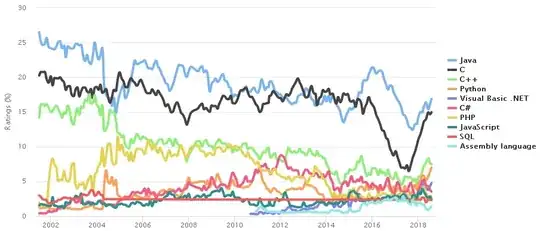The TIOBE Programming Community Index shows Java and C dramatically falling in popularity between late 2016 and mid 2017 before rebounding by mid 2018. What is the cause of the volatility?
-
7The TIOBE index is garbage, whatever the reason why is not consequential. – whatsisname Mar 12 '19 at 04:29
-
1Does it measure popularity by how many search queries are made? Then it could be influenced by new features being introduced, for instance, streams in Java 8. People would start googling to find out how to use it. – parsecer Mar 12 '19 at 19:20
1 Answers
Without access to the raw data or the underlying analytical methodology no one can hope to answer this question.
That being said there is a good balance of probability that the tiobe index faq section already contains the relevant answer:
Q: What happened to Java in April 2004? Did you change your methodology?
A: No, we did not change our methodology at that time. Google changed its methodology. They performed a general sweep action to get rid of all kinds of web sites that had been pushed up. As a consequence, there was a huge drop for languages such as Java and C++. In order to minimize such fluctuations in the future, we added two more search engines (MSN and Yahoo) a few months after this incident.
Essentially, the data collected from Google changed fundamentally, as such the index was unaware of or could not perceive the underlying reality.
Perhaps there were other factors but in understanding any sort of analytical system, always suspect the data source, and method of analysis first, reality a far distant second.
-
2That was in 2004, not 2017, and only affected Java. I consider it just as likely that it was some other factor. For example, [this article](https://www.infoworld.com/article/3212970/java-and-c-hit-all-time-lows-in-tiobe-language-popularity-index.html), which states that Java and C *"have had to share the programming landscape with a growing number of language options attracting developers, which has caused their slippage in the index."* – Robert Harvey Mar 12 '19 at 03:44
-
5However the 2004 dip looks similar in both duration and magnitude to the 2017 dip so it is not an unreasonable observation, though as I've pointed out, without access to the data, its method of collection, and the analytics applied no detailed and reasoned answer can be given. Are there other possible answer? Quite likely. Your claim seems unfounded though. Considering that all other large observed languages in 2017 appear to have slumped, and that both C and Java made massive gains when the other languages where also increasing.It does not fit the trends. – Kain0_0 Mar 12 '19 at 05:46
